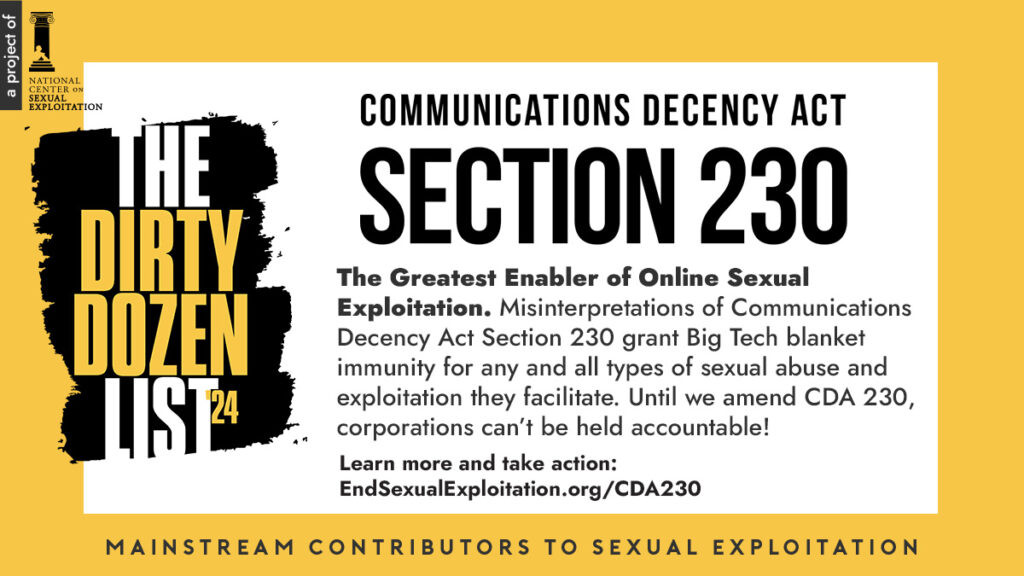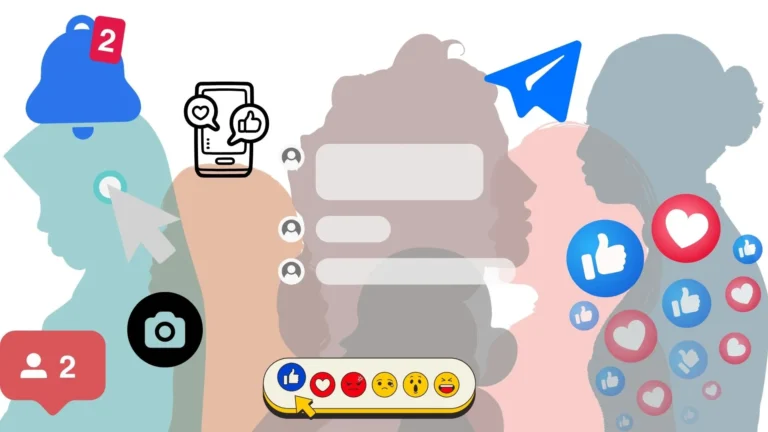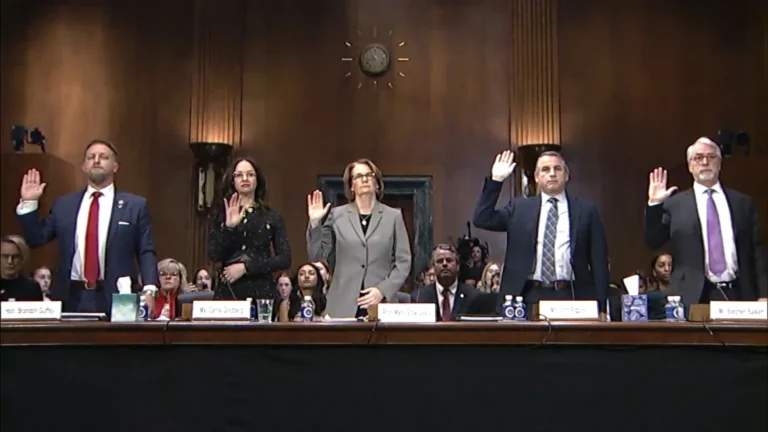A child with severe autism is raped by four adult men after being matched with these men on a dating app that aggressively markets to children.
Twenty-four children die after purchasing suicide kits from Amazon, containing a chemical that Amazon knew had no legitimate household use.
An 11-year-old is paired with a 30-year-old male predator on a video chat platform and becomes the predator’s sex slave for three years.
A mother begs a social media company to take down child sexual abuse material of her son, only for the company to respond, “We’ve reviewed the content, and didn’t find a violation of our policies, so no action will be taken at this time.”
These are true stories of victimized children who have fought tooth and nail, usually without success, to obtain justice in U.S. courts.
What is standing in the way of justice for these children? Section 230 of the Communications Decency Act.
Section 230 of the Communications Decency Act (a.k.a. “CDA 230,” or “Section 230”) is a 28-year-old law that is the century’s greatest enabler of sexual exploitation.
Although not the initial intent of Congress, CDA 230 has been interpreted by courts as granting tech companies near blanket immunity from liability for the harms their products and services facilitate. This is an astonishing privilege that no other industry enjoys.
Together with people like you, NCOSE has been pushing for reform or repeal of CDA 230 for years. Now, Congress is finally moving to make this a reality.
Congress’s “Sunset” Bill Puts Expiry Date on CDA 230
On May 12, Rep. Cathy McMorris Rodgers (R-WA), chair of the powerful house Energy and Commerce Committee, and committee ranking member Frank Pallone, Jr. (D-NJ) publicly circulated bipartisan draft legislation to “sunset” CDA 230. What this means is that, if the sunset bill is approved, CDA 230 would be rendered inactive after December 31, 2025.
Although many members of Congress agree that CDA 230 needs reform, the tech industry has been tremendously uncooperative in discussing what this reform ought to look like, instead derailing conversations with misinformation and fear-mongering tactics. The introduction of a sunset bill puts an expiry date on CDA 230, which would force Big Tech to work with Congress to develop a better legislative framework, or else lose CDA 230 protections completely.
On May 22, the Energy and Commerce Committee held a hearing on the sunset proposal. In her opening statement, Rep. McMorris Rodgers explained the urgent need for this bill:
“They [Big Tech companies] refuse to strengthen their platforms’ protections against predators, drug dealers, sex traffickers, extortioners, and cyberbullies. Our children are the ones paying the greatest price … As long as the status quo prevails, Big Tech has no incentive to change the way they operate, and they will continue putting profits ahead of the mental health of our society and youth.”

Sunsetting CDA 230 Will NOT Break the Internet or Hurt Free Speech
The tech industry has been relentless with fear mongering about the supposed disastrous effects of repealing or reforming CDA 230. In his opening statement at the May 22nd hearing, Ranking Member Pallone aptly called out this behavior, saying:
“I reject Big Tech’s constant scare tactics about reforming Section 230. Reform will not break the Internet or hurt free speech. The First Amendment, not Section 230, is the basis for our nation’s free speech protections and those protections will remain in place regardless of what happens to Section 230.”
It is often erroneously argued that repealing or reforming CDA 230 would set up an untenable situation where tech platforms would have to moderate content perfectly in real-time, or else be held liable for any harmful content that slipped through despite their best efforts. This is simply not true. Removing blanket immunity does not automatically equal liability. It simply means that, like any other industry, tech companies can be sued if a reasonable cause of action exists—for example, if negligence or recklessness on the part of the company led to the occurrence of an injury. Tech companies who truly perform due diligence need not fear liability.
CDA 230 is a Double Standard
CDA 230 has established a baffling double standard where the tech industry enjoys liability protections that no other industry enjoys. Sunsetting CDA 230 would simply remove this double standard.
As victim rights’ attorney Carrie Goldberg testified at the May 22nd hearing:
“I sue [tech companies] for their product defects, just like you would if a community was poisoned by contaminated ground water, or weed killers caused cancer, or an emergency exit door fell off of an airplane mid-flight. But … over the last ten years, I’ve lost more cases because of Section 230 than anyone I know.”
Just like manufacturers of airplanes and weed killers must ensure their products are safe before releasing them into the market, so too should tech companies be required to ensure product safety.
Court Interpretations of CDA 230 Deviate from Original Intent of the Law
When Congress first passed CDA 230 in 1996, its intent was to ensure that a tech company’s “good faith efforts”to moderate and remove harmful third-party content could not be used as a reason to hold it liable for the content. You can read more about this here.
However, since then, court interpretations of CDA 230 have deviated far from the original intent of the law. Now, tech companies enjoy immunity even when they’re acting in bad faith, and even when the harms they cause are not limited to passive hosting of third-party content.
Witness Carrie Goldberg explained that the harms her clients experience on tech platforms are a result of the company’s own conduct—not simply their passive hosting of third-party content. For example, she represents children who were matched with predators on social media platforms or dating sites, and were consequently raped and/or sex trafficked. These dating apps geolocated the children and prompted them to connect with adult strangers.
Tech companies are taking a highly active role in facilitating harm to users. And, thanks to CDA 230, they are doing so with impunity.
Please join us in taking action below, calling for CDA 230 reform.


